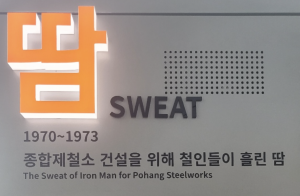Pohang: POSCO Museum
Photo essay of wall text of POSCO Museum of Pohang

Photo essay of wall text of POSCO Museum of Pohang

XXX

Written by: Tony Cho
Research conducted by: Seowoo Nam, Dohee Jeon, Jiyun Lee, Tony Cho
Written by: Tony Cho
Research conducted by: Eunbin Cho, Yuwan Kim, Heewon Kim, Tony Cho

Slow Futures Laboratory presents the Slow Seoul Workshop.
One way Schmid supports her argument of unification through her discussion and presentation of data from nuclear organizations that single countries have attempted to establish but could not take authority because the practices of nuclear science were still in question. Schmid also discusses that in order to allow proper emergency response individual companies need to share the types of reactors they are using so responders understand the equipment they will have to deal with. Lastly Schmid discusses how nuclear response needs to be more of an international because when a nuclear disaster does strike it is not just the nation in ownership of the nuclear facility that is affected.
"As a result, however, the stories were often quite ambiguous as to the nature of the illness, and it was often unclear whether the stories were "reports of experience" or were largely governed by a typical cultural form or narrative structure"
"Stories, perhaps better than other forms, provide a glimpse of the grand ideas that often seem to elude life and defy rational description. Illness stories often seem to provide an especially fine mesh for catching such ideas.
"much of what we know about illness we know through stories - stories told by the sick about their experiences, by family members, doctors, healers, and others in the society. This is a simple fact. "An illness" has a narrative structure, although it is not a closed text, and it is composed as a corpus of stories."
Professionals could use data from this study to further research the affects of nuclear radiation on the human body.